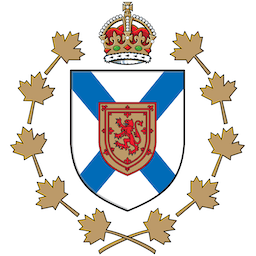Lieutenant Governors of the Province of Nova Scotia since Confederation
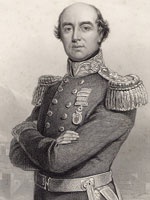
Born in Annapolis Royal the son of the commissary general of Halifax, Sir William Fenwick Williams entered the Royal Military Academy at Woolwich, England, joining the Royal Artillery in 1825. He became the British commander of the Turkish army in Anatolia and was lionized in London for his gallant defense of Kars. He became commander-in-chief of the British forces in Canada from 1859 to 1865, and was belligerent towards the United States in the Trent affair of 1861.
His term as the first Lieutenant Governor of Nova Scotia post Confederation (1867) was only a few months. He retired to New Brunswick that same year. He was knighted as well as created a baronet before dying in London in 1883.
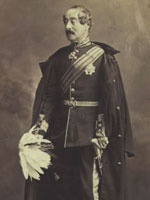
Sir Charles Hastings Doyle was born in London. He studied in Sandhurst and saw army service in the East and West Indies, rising to eventually become the inspector general of the militia in Ireland.
He was sent to command troops in Nova Scotia in 1861 and dealt capably with the problems raised by the American civil war. For this, he gained positive recognition. Doyle was also the first post-confederation Lieutenant Governor of New Brunswick. Later he had to contend with Fenian raids and issues of repeal. He was knighted in 1869, dying several years later, in London.
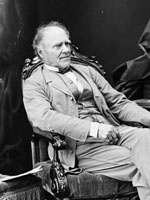
Joseph Howe was born in Halifax, the son of a loyalist journalist from Boston. He began modestly as a printers' devil and rose to become the publisher of ‘The Nova Scotian’ in 1828. Howe is best known for having been successful in a libel case brought against him in 1835, which resulted in the freedom of the press precedent in Canada.
Howe was a member of the legislative assembly from 1836 to 1854, served as Speaker of the assembly between 1840 and 1843, and was the staunchest advocate for responsible government, clashing with Lieutenant Governor Falkland. In 1848, he finally saw this goal achieved under Lieutenant Governor Harvey.
After acting as the provincial secretary from 1848 to 1854, and chairman of the railway board from 1854 to 1857, Howe was elected premier in 1860, which would last until 1863. He was later was appointed imperial fisheries commissioner.
Joe Howe railed against the forces of Confederation, but later accepted a position as secretary of state for the Canadian provinces. As a grace of retirement, he was appointed Lieutenant Governor of Nova Scotia; sadly, he died after just three weeks in office.
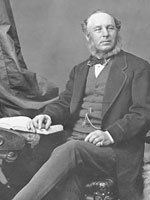
Born in Truro, Nova Scotia, Sir Adams Archibald was educated at the prestigious Pictou Academy. He was called to the bar in Prince Edward Island in 1838 and then to Nova Scotia in 1839. He became a member of the legislative assembly in 1851 and attorney general in 1860; he was also the leader of the Liberal party in 1863.
Archibald was an advocate for Confederation but risked his popularity by supporting the education act of 1864. He was the first Lieutenant Governor of Manitoba and the Northwest Territories between 1870-1873. He was well known for developing and signing treaties with first nations peoples and also founding the civil administration. When it was threatened by Fenians, Archibald rallied Manitoba. He was, however, criticized when he thanked the rebel Métis leader, Louis Riel, for support. He was the first Lieutenant Governor of Nova Scotia (post Confederation) to be re-appointed to a full second term in office.
Archibald returned to Nova Scotia later in life and became a judge in equity, and then Lieutenant Governor. He was a member of parliament from 1888 to 1891, and in 1885 he was knighted as a Knight Commander of the Order of St. Michael and St. George and invested in the Order in 1886. He died at his home in Truro.
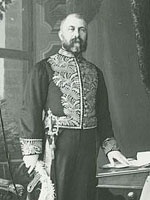
Matthew Henry Richey was born the son of a Methodist minister in Windsor, Nova Scotia.
Educated in Windsor and Upper Canada, Richey was called to the bar in 1850 and practiced law in Halifax. He was elected to the city council in 1858, and served as mayor in 1864 and 1875.
He was a Liberal-Conservative member of parliament from 1878 to 1883, after which he was appointed Lieutenant Governor of Nova Scotia.
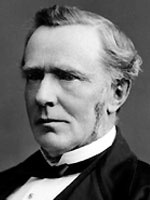
Born in Londonderry, Nova Scotia, Archibald Woodbury MacLelan was the son of a member of the legislative assembly. He was educated at the Mount Allison Academy and worked as a lumber merchant and shipbuilder at Great Village until 1854.
Following in his father’s footsteps, MacLelan was elected as a member of the legislative assembly, serving from 1858-1867, supporting Joseph Howe in resisting Confederation. Post confederation, he served as a Member of Parliament for Colchester (1867-1869), served in the Senate (1869-1881) and was appointed commissioner for the Intercolonial Railway. He also served as Minister of Marine and Fisheries between 1882-1885 and Postmaster General between 1887-1888. That year, he became Lieutenant Governor and served for two years before dying in 1890, at age 65.
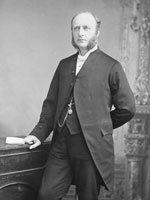
Born in Quebec to Sir Dominick Daly, the Lieutenant Governor of Prince Edward Island, Sir Malachy Bowes Daly was educated overseas in England.
He was later called to the Nova Scotia Bar and served as private secretary to his father and several other former Lieutenant Governors in Prince Edward Island and Nova Scotia. Sir Malachy was also the Member of Parliament for Halifax, being elected in 1878 and again in 1882. He was knighted in 1900 at the end of his Lieutenant Governorship. He was the second Lieutenant Governor of Nova Scotia (post Confederation) to be re-appointed to a full second term in office. He died in 1920 and is buried in the Holy Cross Cemetery, Halifax.
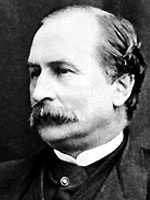
Alfred Gilpin Jones was born in Weymouth, Nova Scotia, and educated at the Yarmouth Academy. After completing his education, he headed an importing firm.
Jones entered politics, becoming a member of parliament from 1867-1872, and from 1874-1878. He was minister of the militia from 1887-1891. In 1900, he was appointed to the Lieutenant Governorship, a post which he held until he died six years later.
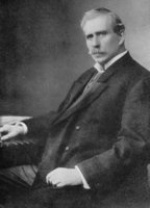
Coming from a family in New Glasgow, Duncan Cameron Fraser began his education at Dalhousie University. He studied law and was called to the Bar in 1873. He was a New Glasgow town councillor in 1878 and later went on to become mayor between 1882-1883. He was also a member of the province’s legislative council and served as minister without portfolio in the executive council.
From 1891-1894 and again between 1896-1904, he represented Guysborough as a Liberal Member of Parliament. Between 1904-1906, he also served as a judge of the Supreme Court of Nova Scotia, before being appointed as Lieutenant Governor in 1906. He died just four years later.

A native of New Glasgow, James Drummond McGregor was the grandson of a pioneer Presbyterian minister. He began his career as a businessman, and was prosperous as a merchant and ship owner. He was also elected mayor of New Glasgow in 1879.
He sat in the Nova Scotia legislative assembly representing Pictou County from 1890-1894 and again between 1897-1900. He was then appointed to the Senate in Ottawa, serving between 1903-1910. He resigned to assume the role of Lieutenant Governor.
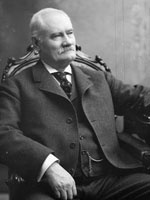
The son of the honourable William MacKeen, David MacKeen was born in Mabou, Cape Breton.
He had a very successful banking and commercial career that led to him to the position of general manager of the Dominion Coal Company.
He was also successful in politics. He was councillor for Little Glace Bay between 1880-1882 and again between 1886-1889, when he was summoned to serve in the Senate. In 1915, he resigned to assume the role of the Lieutenant Governor. He died in office a year later.
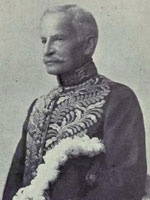
MacCallum Grant was born in Hants County and was successful in a business and insurance career that began in 1873.
In addition to serving as honourary Consul General for Germany c.1899, having lived in Germany for two years, he also held office as the Lieutenant Governor during the disastrous Halifax explosion in 1917 and the visit of the popular Prince of Wales in 1919. He was the last Lieutenant Governor of Nova Scotia (post Confederation) to be re-appointed to a full second term in office. Grant is known for having allowed Government House to be used as a command post during the explosion and also for giving his patronage to a variety of organizations.
He died in Halifax in 1928.
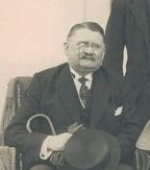
James Robson Douglas was born in Amherst, Nova Scotia, and had a long-lasting and successful career as an acclaimed broker, property developer and businessman. His development contributions to Nova Scotia include the West Highlands subdivision in Amherst.
Shortly after accepting the appointment to Lieutenant Governor, he resigned just nine months later due to pressures relating to his business. This makes him one of the only Lieutenant Governor’s to resign after less than a year of service.
Douglas died in Montreal in 1934.
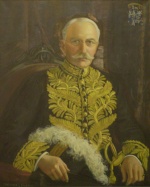
James Cranswick Tory was born in Port Shoreham in 1862.
Educated in Quebec at McGill University, Tory held an executive position at Sun Life Assurance and was a member of the legislative assembly for Guysborough County from 1911-1925. He was then appointed Lieutenant Governor, serving until 1930.
He died in Halifax in 1944.
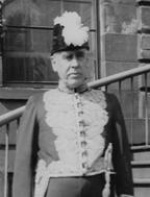
Born in Truro, Nova Scotia, Frank Stanfield pursued an enormously successful career in manufacturing.
He was also actively involved in politics, beginning a long career as a member of the legislative assembly for Colchester from 1911-1920 and again from 1925-1930.
He died while in office as Lieutenant Governor in 1931.
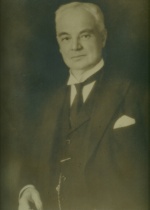
Walter Harold Covert was born in Musquash, Nova Scotia, and was called to the bar to practice law in 1887. His career as businessman and lawyer in Halifax and Saint John were highly successful. He was also a strong supporter and influential member of the Conservative Party.
He was appointed Lieutenant Governor in 1931, serving in the post until 1937.
Covert died in Dartmouth in 1949.
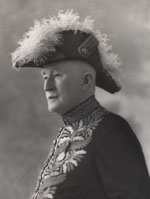
Robert Irwin began as a lumber merchant in Shelburne. In 1906, he entered politics, serving in the Nova Scotia legislative assembly until 1925. Between 1917 and 1925, he held the office of speaker of the house.
He was appointed Lieutenant Governor in 1937, resigned from office in 1940 due to illness, and died a year later, in Shelburne.
Frederick Francis Mathers was born in Saint John, New Brunswick, completed his undergraduate studies at Dalhousie University, and went on to Harvard Law School.
He returned to Halifax to practice law, having been called to the Bar in 1892. Eventually, he became involved in city politics. His postings included deputy provincial secretary and clerk of the executive council (1902 to 1918), registrar of joint stock companies (1910 to 1918), and deputy attorney general (1918 to 1940).
After accepting his appointment as Lieutenant Governor in 1940, he resigned two years later due to poor health. From 1942 until his death in 1947, he held the rank of honourary colonel of the Scottish Rifles.

Henry Ernest Kendall was born in Sydney, Cape Breton. After graduating from Mount Allison University in New Brunswick, he went on to earn a medical degree at McGill University.
Kendall practiced medicine predominantly in Sydney, until the outset of the First World War, during which he acted as a colonel in the medicine corps.
After completing his term as Lieutenant Governor, Kendall retired to his farm in Windsor, Nova Scotia, where he died.
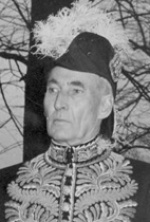
John Alexander Douglas McCurdy was born in Baddeck, Cape Breton, and was educated at the Nova Scotia Technical College and the University of Toronto.
After graduating, he returned to Baddeck to work as an engineer with Alexander Graham Bell. He was intimately involved with the Silver Dart aeroplane, which he piloted in 1909, becoming the first person to fly in the British Empire. McCurdy became Canada's first licenced pilot in 1910. He continued flying until 1916, when vision problems grounded him. He went on to become a pioneer in the Canadian aviation industry.
In 1943, McCurdy was appointed a member of the Order of the British Empire. In 1947, he was appointed Lieutenant Governor, serving until 1952. In 1959, he was awarded the McKee Trophy for service in the advancement of Canadian aviation. McCurdy died in Montreal, June 1961 and was buried in Baddeck. Posthumously, he was inducted into Canada's Aviation Hall of Fame in 1973 and in 2009, the airport in Sydney, Nova Scotia was renamed the J.A.D.McCurdy Sydney Airport.
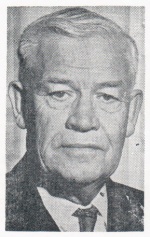
Alistair Fraser was born in New Glasgow, Nova Scotia, the son of the honourable Duncan Fraser.
After being educated at Dalhousie University, Fraser was called to the Bar in 1911. During the First World War, he served as a major and was wounded at Vimy Ridge. He also acted as aide-de-camp to the Canadian corps commander in 1918. He was awarded the Military Cross in 1917.
He joined the legal department of the Canadian National Railways in 1919, rising to vice president of traffic and freight, serving from 1932-1951, after which he retired. Following this, Fraser was appointed Lieutenant Governor, serving for six years.
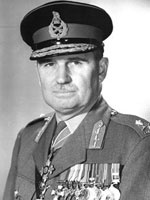
Born in St. Albans, Vermont, Edward Chester Plow settled in Montreal, Quebec. He began a distinguished military career at the Royal Military College and subsequently joined the army, serving at various appointments in Canada and Europe.
He was a senior artillery officer in the Second World War, twice mentioned in dispatches, and remained in Germany with the occupied troops after 1945. Plow led the Eastern Command from 1950 to 1958, after which he returned to Canada and was appointed Lieutenant Governor. He was also a director of the Canadian Imperial Bank of Commerce.
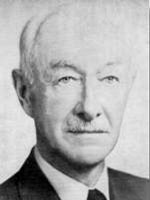
Henry Poole MacKeen was born in Glace Bay, the son of former Lieutenant Governor David MacKeen. He was educated in law at Dalhousie University, graduating in 1921; he was called to the Bar that year. He practiced in Halifax.
MacKeen served in both World Wars and rose to lieutenant colonel during the second. He was appointed Lieutenant Governor in 1963. In 1969, he was appointed both an officer of the Order of Canada and 1st chancellor of Acadia University.
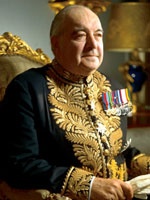
Victor de Bedia Oland was born in Halifax, where he became a company and bank director. Oland sat on the governing bodies of many public service organizations and the Oland family was well known for having financed the building of Bluenose II in 1963.
During the Second World War, he served in the South Pacific with the Royal Canadian Artillery and was appointed brigadier general in the Royal Canadian Artillery upon retirement in 1960. He served as Lieutenant Governor between 1968 and 1973.
In 1980, he was inducted into the Nova Scotia Sports Hall of Fame because of his long-standing commitment to amateur and professional sport in the province. He was the president and chief executive officer of the Halifax Atlantics, Canadian major hockey champions in the 1952-53 and 1953-54 seasons.
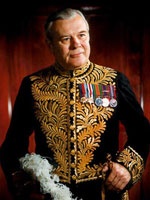
Born in Newfoundland, Clarence Gosse moved to Nova Scotia when he was a child. He began his post-secondary education at Dalhousie and pursued graduate studies in Cleveland, Ohio.
During the Second World War, Gosse served overseas with the medical corps, after which he returned to practice surgery and urology in Halifax. He also taught at the Dalhousie medical school. He was president of the Medical Society of Nova Scotia and the Nova Scotia Council of Health.
Gosse was appointed Lieutenant Governor in 1973. He was appointed an officer of the Order of Canada in 1982.
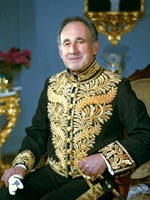
Born in Lawrencetown and educated at Acadia University in Wolfville, John Elvin Shaffner managed his family's retail business in Lawrencetown.
He later became a company director and served as the agent general for Nova Scotia in London, from 1973 to 1976. Following that appointment, he was selected to be Lieutenant Governor and acted as such for a six year term.
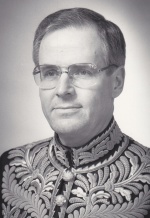
Alan Abraham was born in Halifax and educated at St. Mary's University. He began his career as a land surveyor for the City of Halifax in 1957. Two years later, he became a field supervisor with Atlantic Bridge, after which he took a position as building inspector. Abraham was president of the Better Business Bureau, the Nova Scotia Liberal Association and he sat on the boards of various public service organizations. Other notable positions included acting president of Maritime Warehousing and Transfer, and chairman of Allied Van Lines. He served as Lieutenant Governor between 1984 and 1989. In 1996, he was appointed a member of the Order of Canada. In 2002, he was appointed a member of the Order of Nova Scotia and awarded the Queen Elizabeth II Golden Jubilee Medal.
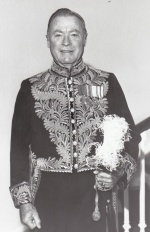
Born in Lunenburg, Lloyd Roseville Crouse established three fishing companies over the course of his life. During the Second World War, he served as a pilot with the Royal Canadian Air Force. In 1957, Crouse was elected the Progressive-Conservative member of parliament for South Shore, an area he represented for 31 consecutive years. While in Ottawa, Crouse served on numerous committees in the House of Commons, and served as Canada's representative to a number of Commonwealth and international conferences. He was chairman of the Canadian Commonwealth Parliamentary Association from 1985 to 1988, and was appointed Lieutenant Governor in 1989. In 2002, he was appointed a member of the Order of Nova Scotia and awarded the Queen Elizabeth II Golden Jubilee Medal.
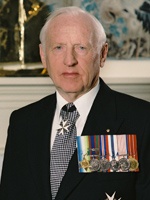
Born in Lunenburg, Kinley was educated at Dalhousie University, the Halifax Institute of Technology, and the Massachusetts Institute of Technology. He served in the Second World War as a merchant mariner, and with the Royal Canadian Navy. He retired as a lieutenant commander in 1959.
Kinley was a professional engineer and served as president of the family foundry and engineering company in Lunenburg for over 50 years. He also served as president of various trade associations, was heavily involved in environmental activities, chaired the Bluenose Atlantic Coastal Action Program, and was the Canadian member of the Duke of Edinburgh's first study conference. In 2002, he was appointed a member of the Order of Nova Scotia and awarded the Queen Elizabeth II Golden Jubilee Medal.
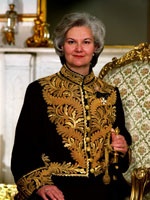
Myra Ava Freeman was born in Saint John, New Brunswick, and graduated from Dalhousie University with a Bachelor of Arts and a Bachelor of Education. While teaching in the Halifax District and the Halifax Regional School Boards, she served on numerous boards and foundations in the community.
She was appointed Lieutenant Governor in 2000, notable because she was the first woman to hold the position in its 400-year history, and she was the first Jewish Lieutenant Governor in Canada.
With the introduction of the Order of Nova Scotia in 2002, she became its first chancellor. In 2002, she was awarded the Queen Elizabeth II Golden Jubilee Medal and in 2008, she was appointed member of the Order of Canada.
While Lieutenant Governor she was appointed as the Honorary Captain (Navy) to Maritime Forces Atlantic in 2003, an appointment she held until 2015. For her distinguished service in this latter role, she was awarded the Meritorious Service Medal in 2012.
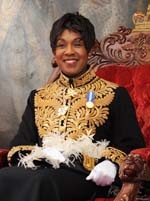
Born in Whitney Pier, Nova Scotia, The Hon. Mayann Francis was the first African Nova Scotian, and only the second woman to hold the position of Lieutenant Governor. She was also the first permanent female Director and CEO of the Nova Scotia Human Rights Commission, and the first woman to be appointed Ombudsman in Nova Scotia.
Prior to becoming Lieutenant Governor, Ms. Francis earned a Masters Degree in Public Administration from New York University and went on to hold a number of senior positions in the private and public sectors in both the U.S. and Canada. She also worked on a variety of projects in Canada, the United States and overseas and served on numerous boards.
In 2008, Ms. Francis was awarded an Honorary Doctorate in Humane Letters from Mount Saint Vincent University. From 2008-2012 she was Honorary Lieutenant Colonel of 3 Intelligence Company. In 2010, the University of the West Indies awarded her the Luminary Award in recognition of her public service and outstanding citizenship.
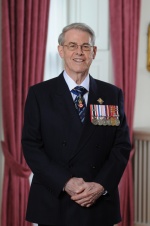
John James Grant was installed as the 32nd Lieutenant Governor of Nova Scotia on April 12, 2012.
Born in New Glasgow, Brigadier-General The Hon. John James Grant Honour graduated from Mount Allison University with a Bachelor of Commerce degree and earned the designation as a Registered Industrial Accountant.
In addition to an active business life as co-owner of J.J. Grant Ltd Castle Building Centre, Brigadier-General Grant was a long serving member of Her Majesty’s Canadian Forces. Rising to the rank of Brigadier-General, he served in his final positions as Commander of Atlantic Militia Area and then as Chief of Staff Reserves for the Canadian Army.
In 1979, he was appointed an Officer of the Order of Military Merit and was subsequently promoted to Commander of the Order. Following his retirement from the Canadian Forces he went on to serve as Honorary Lieutenant Colonel of both the 1st Battalion, The Nova Scotia Highlanders (North) and the 2nd Battalion, The Nova Scotia Highlanders (Cape Breton).
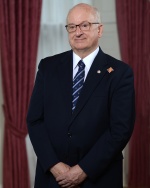
Arthur Joseph LeBlanc was installed as the 33rd Lieutenant Governor of Nova Scotia on June 28, 2017.
His Honour was born in West Arichat, Nova Scotia. He graduated from St. Francis Xavier University with a Bachelor of Commerce Degree and he earned a Bachelor of Laws Degree from Dalhousie University. Following graduation, he was admitted to the Nova Scotia Barristers’ Society.
His Honour practiced law for over 30 years, initially as an associate of Vincent deP Burke and subsequently as senior partner of the law firm LeBlanc MacDonald and Pickup. This firm was succeeded by LeBlanc MacDonald, where he maintained a solicitor’s practice and subsequently concentrated his practice in civil litigation. His Honour was appointed as King’s Counsel in recognition of his distinguished law career.
In 1998, he was appointed as a Justice of the Supreme Court of Nova Scotia (General Division) and served on the bench until he was installed as Lieutenant Governor.
